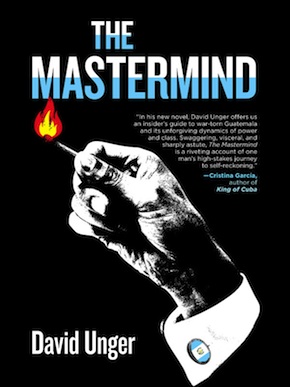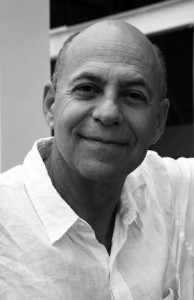Land of eternal spring
by David Unger
“A merciless analysis of the dark web of a country, perhaps of a whole continent, and, finally, of all forms of organised power.” Andrés Neuman
I decided to write The Mastermind for two reasons. After publishing four novels set during different periods of Guatemala’s history, I wanted to see if I could write a book that dealt with an incident grounded in my birthplace’s contemporary reality. Secondly I was intrigued by the internationally reported 2009 Rodrigo Rosenberg case in which the charismatic, conservative lawyer made a recording accusing Guatemala’s leftist president of engineering his murder and the assassination of his lover Marjorie Musa and her father in a drive-by shooting six weeks earlier.
When the recording was released at Rosenberg’s funeral, the ruling classes demanded that President Alvaro Colum resign peacefully or be overthrown by the military (a horrific option in a country that has seen multiple violent regime changes in the past 80 years). The president appointed a special prosecutor from Spain and refused to quit office. When Judge Castresana delivered his findings many months later (see David Grann’s excellent 2011 account in the The New Yorker), he cleared the President of any wrongdoing and accused Rosenberg of hiring hit-men to kill him because he was depressed over Marjorie’s death. All of Guatemala and much of the world seemed shocked by the special prosecutor’s revelations, and voiced support for the notion that life is stranger than fiction.
As a novelist, this dictum is unacceptable; I wrote The Mastermind to prove that fiction is always more bizarre, inventive and amusing than life can ever be. Unlike Truman Capote’s systematic research in preparation for writing In Cold Blood, I didn’t follow a line of investigation and actually shunned the many books and films that had come out about the Rosenberg case. This permitted me to explore in fictive form some of my own theories about what ails Guatemala and many other struggling countries around the world, and to also understand the true motivations of a handful of ‘real’ characters.
To a large extent, Guatemala is a clear example of a failed state. After 36 years of armed conflict in which 200,000 mostly innocent citizens died, the governing institutions have been badly damaged and are on life-support. Murder, corruption, burglary, assaults, femicide, rape and gang warfare are so rampant that many citizens have lost hope of ever living in a safe civil society. In 2015, both the president and vice-president were forced to resign and are presently imprisoned, albeit comfortably. Later that year, a former television clown with no governing experience was elected with the support of former military thugs.
I used the Rosenberg case as a platform to write my own story, recklessly distorting and perverting accepted facts. The Mastermind is both the torrid love story and an exploration of corruption and impunity in Guatemala.”
At the same time, Guatemala happens to be a country with spectacular volcanoes, preserved colonial cities, and first-rate Mayan ruins that are visited and enjoyed by nearly two million tourists each year. How can these two realities coexist? Is there such a thing as distinct parallel universes?
I used the Rosenberg case as a platform to write my own story, recklessly distorting and perverting accepted facts. The Mastermind is both the torrid love story of Guillermo Rosensweig and Maryam Khalil and an exploration of corruption and impunity in Guatemala. My intention was not to write a captivating thriller, but to reveal the inner mechanisms of the corruption that can and does exist in Guatemala, and in which there are various, morphing puppet-masters. I wanted readers to be initially dismayed and disgusted by my disreputable protagonist but, at the same time, I wanted to transform him (through his love for Maryam and his realization of the depths of his degeneracy) so that he would become sympathetic as the novel progressed. At the same time I wanted to offer readers varied readings and interpretations of what appeared to have happened, the so-called ‘facts’ in the Rosenberg case.
Most of all, I wanted to write a good, solid and entertaining story incorporating unexpected twists, leading readers to be more informed about themselves and the social and cultural complexity of a country not that different in many ways from the United States.
The Mastermind was translated and published in Mexico by Planeta (as El manipulador) nine months before Akashic Books published it in English. When I launched the novel in Guatemala City last July, the reaction of the public didn’t surprise me. I was applauded by those who admired my use of Rosenberg as a trampoline, but attacked by Guatemalans who hadn’t read the novel, but thought they knew how I had transformed the case. It was disheartening, really, to defend myself to people who hadn’t bothered to read my book, but simply assumed from reviews or interviews that I had maligned the Rosenberg/Musa families. To some degree, this was not totally unexpected; it is almost a Guatemalan tradition to judge or condemn someone or something through innuendo, or without really having any knowledge about was said or done.
I’m looking forward to the novel’s reception in the Anglophone world. Pre-publication notices have referred to it, not surprisingly, as an international thriller, a mystery, and an example of crime fiction based on true events – these responses are natural since most people believe art imitates reality in Central America. I’m curious to see if reviewers think of it as a love story circumvented by hatred and revenge, first and foremost, or an elaborate dissection of a corrupt society.
When I think back, I decided to create Rodrigo Rosenberg’s alter ego to try and understand the events that almost led to regime change in my homeland seven years ago. As so often happens, I started creating ‘real-life’ characters that, early on, took on a life of their own and directed the novel’s course with little intervention from the writer. Yes, I wrote the book and am its ultimate mastermind (as all writers must be), but somehow on my way to the store I ended up somewhere else.
 David Unger is a Guatemalan-born writer and translator based in Brooklyn. He was the 2014 winner of his native country’s Miguel Angel Asturias’ National Literature Prize for lifetime achievement, despite writing exclusively in English. His novels include The Price of Escape and Life in the Damn Tropics and his short stories and essays have appeared in Words Without Borders, Guernica, Playboy Mexico and other publications. He has translated fourteen books from the Spanish, including works by Teresa Cárdenas, Rigoberta Menchú and Ana Maria Machado. The Mastermind is published by Akashic Books.
David Unger is a Guatemalan-born writer and translator based in Brooklyn. He was the 2014 winner of his native country’s Miguel Angel Asturias’ National Literature Prize for lifetime achievement, despite writing exclusively in English. His novels include The Price of Escape and Life in the Damn Tropics and his short stories and essays have appeared in Words Without Borders, Guernica, Playboy Mexico and other publications. He has translated fourteen books from the Spanish, including works by Teresa Cárdenas, Rigoberta Menchú and Ana Maria Machado. The Mastermind is published by Akashic Books.
Read more.
Buy at Amazon.
Author portrait © Maria Auxilio Ballinas

